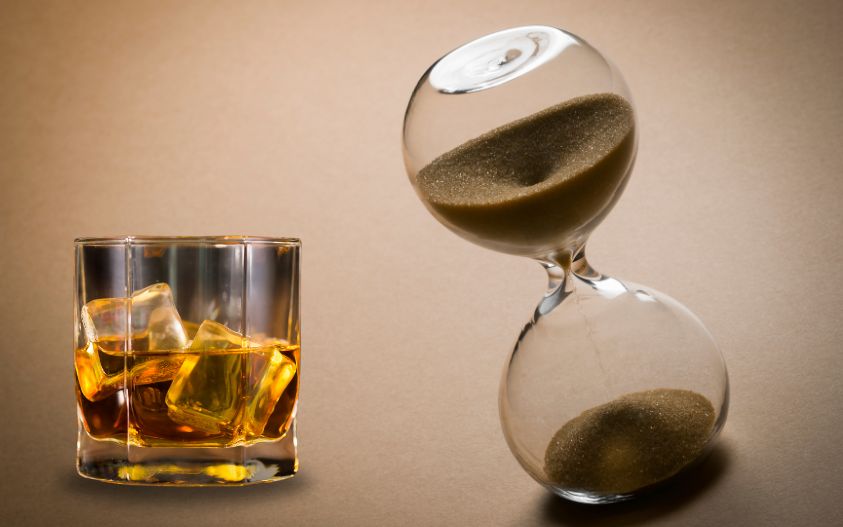Recovery from alcohol addiction is a long process with multiple challenges along the way. Every step of the journey is crucial, but none as significant as alcohol withdrawal or detox. It’s the only way to get on the right track because, as long as the body remains dependent on alcohol, any psychological growth continues to be reversed.
Unfortunately, withdrawal from alcohol can be intense. The symptoms are difficult to manage and can be dangerous, which is why a detox supervised by medical professionals is recommended. The best rehabs provide medical detox, increasing the likelihood of success and ensuring the person is in safe hands.
What exactly does happen during alcohol withdrawal and thereafter? Here is what the person can expect.

What to Expect in the First 72 Hours of Alcohol Withdrawal
Early Withdrawal Symptoms (6-24 Hours)
During the initial hours without alcohol, the body begins to react to the sudden absence of alcohol in the bloodstream, resulting in a range of physical and mental symptoms. This phase, often known as “early withdrawal,” can be uncomfortable as the body and brain attempt to stabilize.
- Physical symptoms, including headaches, sweating, tremors, nausea, and gastrointestinal discomfort. Many people experience shakiness as well.
- Mental and emotional symptoms, including anxiety, irritability, and restlessness
Peak Withdrawal Period (24-72 Hours)
Between 24 and 72 hours, symptoms generally peak, and this phase can be the most challenging for many individuals.
- Increased physical discomfort, with sweating, nausea, and elevated blood pressure becoming worse. Heart rate might spike, and some may feel a racing pulse.
- Severe symptoms may become apparent, including hallucinations (both auditory and visual) and delirium tremens (DTs), which is a potentially life-threatening condition characterized by severe confusion, agitation, and tremors.
This is a crucial phase in detox, as it can determine how the rest of the withdrawal process will unfold. Proper support and monitoring are essential during this time.
Physical and Psychological Changes After 72 Hours
You may have already been familiar with that brief primer on what happens immediately after stopping alcohol. But what happens next?
The good news is that after reaching the 72-hour mark, many of the initial physical symptoms, including nausea, headaches, and shakiness, start to subside, and the body begins recovering. Milder headaches and fatigue may persist as the body stabilizes itself.
Vital signs like blood pressure and heart rate, which often spike during the early stages of withdrawal, also start to stabilize. This improvement shows that the body is regaining equilibrium, no longer requiring alcohol to continue functioning.
The initial withdrawal period can wreak havoc on sleep, causing insomnia and interrupted sleep cycles. Now, however, the person’s sleep patterns begin to normalize. There may still be some issues, including vivid dreams and insomnia, but sleep quality continues to gradually improve as the person’s recovery goes on.
Finally, cravings begin to decrease, at least on a physical level. They do not completely go away, however. Depending on the person and their circumstances, psychological cravings can persist for a while. The next step is not eliminating them entirely, but rather learning to manage them without using alcohol.
What Challenges Remain After 72 Hours?
While the initial withdrawal symptoms may have subsided, there are still challenges caused by withdrawals after 72 hours have passed. The psychological and emotional aspects of recovery in particular become more pronounced. This is why it is so important for a person to enter the next phase of rehab directly after detox.
PAWS (Post-Acute Withdrawal Syndrome)
Post-Acute Withdrawal Syndrome, or PAWS, refers to a range of lingering symptoms that can persist for weeks or months after the acute withdrawal phase. Symptoms of PAWS include:
- Mood swings
- Difficulty concentrating
- Insomnia or disturbed sleep
- Fatigue and low energy levels
PAWS can be challenging to navigate, as these symptoms might appear suddenly and impact emotional well-being. However, with the right support and an understanding of what to expect, they can be considered a normal aspect of a healthy recovery.
Emotional and Mental Health Impact
Withdrawal from alcohol does not magically alleviate emotional pain. Even once 72 hours have passed, the person often feels intense and raw emotions. They have likely used alcohol as an emotional crutch for an extended period of time. Emotions and issues that have remained latent may surface. Some might experience a resurgence of anxiety or depression, which can be unsettling.
It is therefore crucial to have a support system and to continue with the psychological aspects of recovery.
Positive Changes After 72 Hours
While withdrawal does continue to affect the person negatively after 72 hours, the benefits soon become apparent. The body and mind are going through a healing process which is rewarding even when it is most grueling.
With alcohol no longer in the body, vital organs, especially the liver, start repairing damage done by excessive drinking. Over time, the person notices:
- Better liver function, leading to improved digestion, metabolism, and energy levels.
- An improvement in skin health, with redness and puffiness dissipating and the skin appearing clearer, more hydrated, and rejuvenated.
- A stronger immune system, making the person less susceptible to illness.
With mental clarity returning, the person finds themselves better able to manage psychological challenges without turning to alcohol. They experience:
- Increased emotional stability, with mood swings and irritability lessening as balance returns to neurotransmitter levels in the brain.
- Greater self-awareness and mindfulness, becoming more introspective and gaining deeper insight into the reasons behind their drinking.
- The emergence of new coping mechanisms, like exercise, meditation, or creativity.
Conclusion
Withdrawal from alcohol is a tough process that is both physically and mentally grueling. However, it is the crucial first phase of recovery and leads to immediate benefits once the first three days have passed. Some withdrawal symptoms will remain, but as the person spends time recovering without alcohol in their system, these challenges subside and they experience a renewed sense of happiness and meaning.




